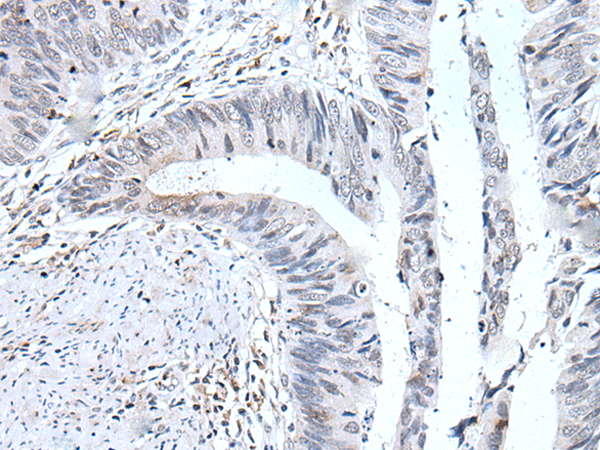
| WB | 咨询技术 | Human,Mouse,Rat |
| IF | 咨询技术 | Human,Mouse,Rat |
| IHC | 1/25-1/100 | Human,Mouse,Rat |
| ICC | 技术咨询 | Human,Mouse,Rat |
| FCM | 咨询技术 | Human,Mouse,Rat |
| Elisa | 1/5000-1/10000 | Human,Mouse,Rat |
| Aliases | FANCT; PIG50; HSPC150 |
| Host/Isotype | Rabbit IgG |
| Antibody Type | Primary antibody |
| Storage | Store at 4°C short term. Aliquot and store at -20°C long term. Avoid freeze/thaw cycles. |
| Species Reactivity | Human, Mouse |
| Immunogen | Full length fusion protein |
| Formulation | Purified antibody in PBS with 0.05% sodium azide and 50% glycerol. |
+ +
以下是3篇关于UBE2T抗体的模拟参考文献(注:以下内容为示例,实际文献请通过学术数据库检索验证):
---
1. **文献名称**: *UBE2T Expression Correlates with Poor Prognosis in Hepatocellular Carcinoma*
**作者**: Li X, Zhang Y, Chen R
**摘要**: 本研究利用UBE2T抗体进行免疫组化分析,发现UBE2T在肝癌组织中高表达,且与患者生存期缩短显著相关。机制研究表明UBE2T通过调控Wnt/β-catenin通路促进肿瘤侵袭。
---
2. **文献名称**: *UBE2T Antibody-Based Detection of Fanconi Anemia Pathway Dysregulation*
**作者**: Thompson S, et al.
**摘要**: 通过UBE2T特异性抗体进行Western blot和免疫荧光实验,揭示了UBE2T在范可尼贫血(Fanconi anemia)患者细胞中的功能缺失,导致DNA修复缺陷和染色体不稳定性。
---
3. **文献名称**: *Targeting UBE2T as a Therapeutic Strategy in BRCA1-Deficient Cancers*
**作者**: Wang H, et al.
**摘要**: 使用UBE2T敲低模型和抗体验证实验,证明抑制UBE2T可选择性杀伤BRCA1突变型乳腺癌细胞,提示其作为合成致死疗法的潜在靶点。
---
如需具体文献,建议通过PubMed、Google Scholar等平台检索关键词“UBE2T antibody”或“UBE2T function”。
UBE2T (Ubiquitin-conjugating enzyme E2 T) is a member of the E2 ubiquitin-conjugating enzyme family, which plays a critical role in the ubiquitination cascade by transferring ubiquitin to target proteins in collaboration with E3 ligases. It is particularly notable for its involvement in the Fanconi anemia (FA) DNA repair pathway, where it interacts with FANCL, the E3 ligase component of the FA core complex. UBE2T-mediated ubiquitination of FANCD2 and FANCI is essential for activating the FA pathway, enabling repair of DNA interstrand crosslinks and maintaining genomic stability. Dysregulation of UBE2T has been linked to Fanconi anemia-related disorders and cancer, with studies showing its overexpression in various malignancies, including breast, liver, and lung cancers, where it may promote genomic instability and tumor progression.
Antibodies targeting UBE2T are vital tools for studying its expression, localization, and functional roles. These antibodies are widely used in techniques like Western blotting, immunohistochemistry, and immunofluorescence to assess UBE2T protein levels in cellular and tissue samples. Researchers also employ UBE2T-specific antibodies for co-immunoprecipitation assays to explore its interactions with pathway partners, such as FANCL or FANCD2. Additionally, these reagents help investigate UBE2T's post-translational modifications and its involvement in cellular stress responses. Given UBE2T's emerging role as a potential biomarker or therapeutic target in cancer, reliable antibodies are crucial for both basic research and clinical applications aimed at understanding disease mechanisms or developing targeted therapies.
×